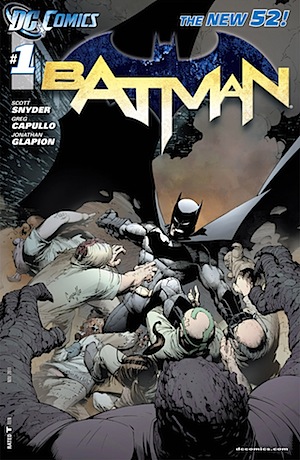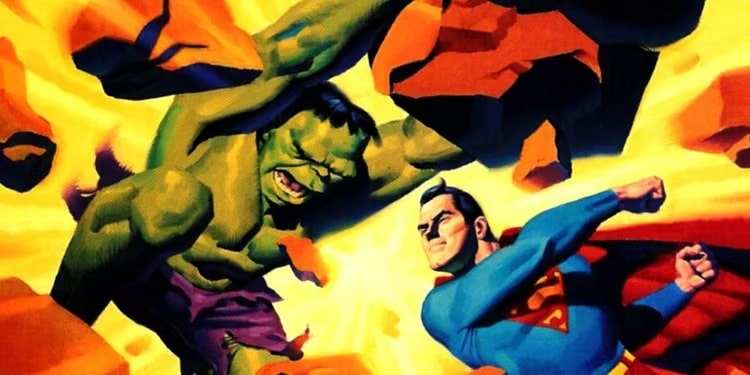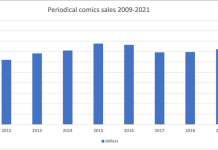
As great as 2011 was for the comics industry in both quality and sales (with a big surge thanks to DC Comics The New 52 Relaunch), if you take an honest look at the trends and data, it’s hard to ignore the truth. And that truth is that the audience and market for comic books is getting smaller ever year. There are upticks and trends like the DC Comics surge, Image Comics and IDW doing well and things like that, but ultimately, in the big picture, the numbers are going down. It’s tougher than ever to own and operate a comic book store and while we all see Digital Comics as the great hope, it’s still way early in the game. I don’t see a point where comics aren’t present in this world, but we have to face facts that things are pretty rough. I can’t imagine what it’s like to be a comic book publisher, much less an independent comic book publisher, these days. We tend to focus on positive things and promoting books that are good because we want to see all the publishers and all the comics stick around. We get upset when books we like get canceled because we like them. Every book that I no longer read due to a cancellation from low sales is one less book that I find enjoyment from on a monthly basis and that’s sad. The less times that happens, the better.
I don’t see the failing sales as an end of comics — there are more comics than ever, really, if you look at Webcomics — but it is a bit sobering to contemplate.







Perhaps this post should be renamed “the glass is half empty for superhero comic books.” As he says, “truth is that the audience and market for comic books is getting smaller ever year.” Of course its very tough for direct market retailers, indeed its tough for all indie retailers. But there are more comics being produced in more genres, available through more outlets digital and physical and more people reading them than ever before. But superhero comics will continue to slide.
honestly, saying that theres hope because theres a ton of webcomics is the equivalent of saying that the music scene is better now because lots of mediocre bands have tumblrs that they update with a new song occasionally.
yeah theres more, but is it really better? bands that used to go through two pressings of 3000 records now do one pressing of 500. its a very similar case and lemme tell you: DIY music is NOT doing better than it was 10 years ago.
Isn’t there a profitability problem, though? An increase in the number of titles is only good if it’s accompanied by similar increases in the profitability of releases. Where are the bestsellers which compensate for less-profitable books going to come from in the adult comics market? It would be interesting to see a comparison between the costs of producing, say, a 96-page OGN and a 300-page prose novel, and how the costs affect profitability.
I’d guess that superhero comics are doomed, just because movies and other forms of entertainment do better jobs of depicting the heroes for audiences.
SRS
2011 will be up over 2001 in comics periodicals shipped — and there’s at least $200 million annually in trade paperback activity that wasn’t there ten years ago. Perhaps half of that is in the direct market. That’s not just inflation — that’s more trades being sold.
The audience for many individual titles is observably shrinking. But the aggregate tells a different story. There are more comics in people’s hands than ten years ago.
Two thoughts here…
1) Comics will never die. There will always be people who will prefer communicating ideas with drawn pictures. However, the business of selling comics as a commodity might shift from dedicated stores to individuals.
2) John’s excellent point is in the aggregate, there are more comics reaching customers and that’s *really* important and overlooked. That being said, I agree with the author of the quote above the data available has been showing a down tick in the business of periodical comic books.
In addition to what JJ said, that the “sales of the best selling comic” is a lower number probably shouldn’t be seen as any kind of a surprise, given that there are far more titles (and, for that matter, releases of the same title, with Marvel’s move towards 15+ times a year shipping), competing for the same consumers.
-B
yes there are more comics being published than ever before and yes they are lot better. Especially the nonsuperhero comics. In fact, way better. Comics these days have never been better and comics are way bigger than any one genre.
In other words, the same thing people have been saying for the past 13 years or so. Nothing new here.
While Brian is right that you have to factor in the greater range of titles on sale, it’s certainly hard to avoid the feeling that Marvel’s strategy in particular is based predominantly on extracting more money from a declining audience.
I didn’t mention it in my 2011 review, but one thing that should be mentioned:
Graphic novels have matured. There is no “book of the year” (although Habibi was highly anticipated), we don’t get excited when a novel is adapted into a graphic novel, or a bestselling author writes a graphic novel, or a movie is made.
We used to grow weary of the “crash bang boom” headlines, but now we grow complacent over Google News feeds of “college library has comics” or “high school library promotes comics” or “local individual makes a comic book”. Or when the New York Times runs an article on comics.
We’ve won. Yes, superhero comics and adventure comics might be slowly collapsing, just like television soap operas (of which they share numerous similarities). Graphic novels for kids, graphic novels for teens, graphic novels for adults… it’s as varied as regular books. (Non-fiction could be better, but even there we’ve got some great titles, like Feynman.)
Everyone knows comics. People “get” graphic novels. Give me a reader, let me interview them, and I will be able to recommend a good graphic novel (and possibly a GREAT graphic novel) to suit their tastes.
Kids still love superheroes, kids love to read comics, and kids love to draw. Teachers love comics because even “reluctant readers” will read a comic book. Comics have words and pictures, so they can be used in English and Art classes, and even as part of the curriculum (like Texas History Movies).
So, yeah, mass market paper editions (mass market paperbacks, comics, magazines, newspapers) are being replaced by digital media. But comics aren’t going to go away…
not when the freaking INTERNET is words and pictures!
Yes, well Marvel strategy, in particular, would appear to be the wrong LONG-TERM one.
But I don’t think they give a damn past the next quarter?
-B
Right on, Torsten. 100%–everything you point out here is true.
A shrinking superhero market is not an altogether bad thing.
Once upon a time, Poison and Warrant and Motley Crue and Ratt were huge sellers, too.
Other big, shocking news: Radio drama is in a decline, poetry sales are low, pinball is a niche industry, new technology leaves some people confounded, kids are crazy, pop music is loud and dumb, war sucks.
comics as a creative medium is far from dying. Whats really in danger is the ability for talented creators to make an actual living from making comics as their full time job….which will eventually effect the quality of what’s being published.
Instead of new 52, it will soon be new 42. Wonder what backup titles Didio/Harras can pull out of their butt.
“Comics these days have never been better and comics are way bigger than any one genre.”
Some comics are better … some are worse. And many comics from 1940 through 1990 were better … and a few were worse … That sounds more plausible.
There is something awesomely solipsistic about comics fans (especially superhero comics fans) assuming that their particular portion of the publishing universe is the end-all and be-all of the medium.
I was going to say something snarky to RM Rhodes about indie comics not exactly being free of solipsism, but I thought better of it, went to the RM Rhodes web site, and saw what looks like some pretty cool art.
@Sam First, thanks for the compliment.
Second, you are absolutely correct about indie comics and solipsism. I’d even go so far as to say that it’s endemic to just about every artform and their component sub-groups. Superhero comics just happens to be the highest profile example at hand.
I am more suprised that everyone doesn’t think DC and Marvel have known for at least a decade or longer that their fan base is erroding. Based on cover price increases and volume of shipped books it would appear that they are minning what they can of the existing demographic node’s revenue stream before it runs dry.
Torsten’s comment made me think of my younger son, who is mildly mentally disabled. After much effort we got him up to a very basic literacy level, but he wouldn’t consider reading for pleasure.
UNTIL I started leaving my various comics in the bathroom. Before long, my son glommed onto one of those comics — a trade paperback collection of the webcomic PvP. (Which is why no matter what else happens, Scott Kurtz will always be a hero at our house.)
His tastes have broadened a bit since then, but interestingly, even though he’ll watch superhero movies and cartoons, he has no interest in superhero comics. He prefers Sonic the Hedgehog and The Simpsons.